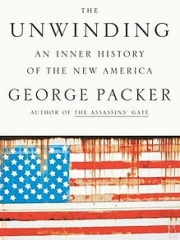The Unwinding by George Packer
I don’t know America. I’ve spent most of my life within a one-hour radius in Massachusetts. That’s why it’s great that I get to travel as part of my job. Winston-Salem and Harrisburg are not glamorous, but perhaps they are closer to the ‘real’ America than Cambridge is. An even better part of my job is that I get to travel on the weekends. In this election year, when I feel more than ever that I have no clue what and who America is, I’ve taken advantage of this to visit as many places in the US of A as possible: Ann Arbor, Puerto Rico, LA, DC, New Orleans, Tampa, NYC, SF, Portland, Denver, and Austin. Yes, these are some of the most liberal cities, so I’m not necessarily putting myself in the other half’s shoes. But it’s a start to getting to know this country.
This book is one of my other attempts to understand America. It has a slight liberal slant – and that only goes to show how one’s beliefs are self-reinforcing. In this age of personalized information feeds, no one has to hear what he/she doesn’t want to hear. Regardless, it was very cool to connect the narratives in the book to my recent treks across the country. For example, Sheetz plays a big part in one character’s story – and I didn’t even know what Sheetz was until I started this project in Harrisburg – which includes two weekly two-hour drive through the exciting land of billboards and trucks. Another example is the empty promise of Tampa, which felt like a place in limbo when I visited.
1) Newt Gingrich came to power with his ‘Contract with America’ and served as Speaker of the House during Bill Clinton’s presidency.
I didn’t like that post-WWII American history was not really part of the APUSH curriculum. I feel like I have this giant gap in history knowledge from 1945 – 2008. All I knew of Gingrich before this book was that he sort of ran for president in 2012, and people did not like him.
2) Biden’s wife and one-year old daughter were killed in a car accident.
Throughout his Senate career, in order to spend time with his sons, he commuted from Delaware to DC every day.
3) Stores raise their prices at the beginning of the month since people on welfare can only buy things then.
If true, that’s sad. Very reminiscent of my business strategies in Roller Coaster Tycoon. If rain, then price of umbrella = $20.
4) Oprah’s name was originally Orpah. Her family couldn’t pronounce it correctly, so it became Oprah.
Oprah is also apparently responsible for empowering the anti-vaccine movement by bringing Jenny McCarthy onto her show.
5) If a presidential primary candidate can raise $250 each from 20 people in 20 states, then he/she qualifies for public matching fund.
The money comes from checking a box on tax returns.
6) RJ Reynolds made Winston Salem a tobacco city.
Winston Salem might be one of the most depressing cities I’ve been to. It feels like it’s stuck in the past and not in a good way.
7) Sam Walton opened his first discount store in Rogers, Arkansas in 1962. He gave it a short name to save money.
Walton would fly his Air Coupe over towns to spot the best locations for Wal-Mart.
8) Confinity, the creator of Paypal, was the first company to offer cryogenics as an employee benefit.
The only surprising part of the national conventions was Thiel’s support of Trump. If I have time, I’ll go back and watch the speech. Thiel’s political position has always been contrarian as a gay Republican from Stanford.
9) Focusing on the concept of locally grown and organic ingredients, Alice Waters opened Chez Panisse in CA in 1971.
Was this the beginning of the modern-day fad of organic and cold-brew food?
10) Peak oil refers to the point of maximum rate of petroleum extraction.
M. King Hubbert predicted that the US would hit peak oil in 1970. His theory seemed correct until fracking came along. For me, this is yet another example of how a lot of economic theories are pointless because their purpose is to fit some recent trends. See Philips Curve.
This book is a tour through different parts of America over the past 30 years. Unlike most nonfiction books I’ve read, it gets better in the second half – perhaps it’s just that I can more easily relate to the 2000s than the 1980s. My only complaint is that I don’t agree with the book’s premise – the unwinding. America has never been one. No place has ever been one. It’s not an unwinding. It’s about what America does best, which is letting its people speak up and vote for what they want.
